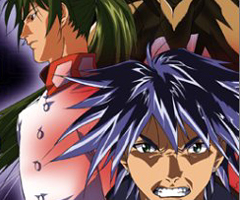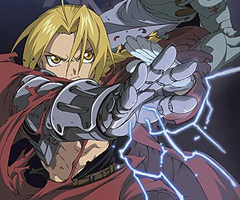Mizushima Seiji’s Panel, Otakon 2005
Baltimore, MD, USA. August 19, 2005
Reporter(s): Kuzu Ryu Sen
 Mizushima Seiji is perhaps the most popular anime director in America right now, despite most of his fans probably not knowing his name. After all, it’s not that often that one of your works sweeps across Japan and America like Fullmetal Alchemist has. Aside from his claim to fame, Mizushima-san has also directed, in some capacity, Neon Genesis Evangelion, Generator Gawl, Shaman King, Slayers NEXT,and Zaion: I Wish You Were Here. One thing can be certain: Fullmetal Alchemist will not be the end to this man’s fame.
Mizushima Seiji is perhaps the most popular anime director in America right now, despite most of his fans probably not knowing his name. After all, it’s not that often that one of your works sweeps across Japan and America like Fullmetal Alchemist has. Aside from his claim to fame, Mizushima-san has also directed, in some capacity, Neon Genesis Evangelion, Generator Gawl, Shaman King, Slayers NEXT,and Zaion: I Wish You Were Here. One thing can be certain: Fullmetal Alchemist will not be the end to this man’s fame.
Hello, my name is Mizushima Seiji, and I direct anime. This is my very first visit to an overseas convention, and I’m very glad to see everyone in the audience. I hope this panel will be a fun one.
Will there be a sequel to Generator Gawl?
Well, the story is done, so it’s difficult to make a continuation. It was my debut work, so I would be happy to work on it again, but right now, it’s not in the plans.
How did you work with the original manga author on the ending to Fullmetal Alchemistdespite the manga being uncompleted?
Yes, there was very little to work with when we were initially making Fullmetal Alchemist, so what we did was we got the plot overview from Arakawa-sensei [the manga author].
Mind you, it was about 50% coincidence that the anime ended up matching the manga. It was just a matter of piecing together the clues.
What was your inspiration for entering the industry?
Well, I always loved anime since I was little, so therefore I thought I would make a career of it. Well, I went to Anime School, and then I got an opportunity. I also saw some anime out there that had some sloppy direction, so I wanted to do better, so that affected my decision to become a director as well.
Well, as you can see, my direct motive wasn’t so profound, but since starting, I’ve always been looking for how to tell a better story, etc…
How much of working in the industry is social, and how much is professional?
Well, half the industry is comprised of freelancers, including myself. Freelancers tend to move often naturally, but they do recruit their teams based on people who have had histories with them.
For example, Maruyama-san is another guest here, and he and other producers will often hand pick their staffs regardless of studio.
Is directing hard?
Well, if it wasn’t, then anyone could do it, and there would be no job security whatsoever. But really, the only thing you need to succeed is passion.
Do you read original works?
I feel that I consistently need new material, so yes, I read manga.
I tend to read minor works rather than the popular ones, and my wife often scolds me to read things like Shonen Jump.
Now, is what I read related to work? Yes.
As for that, with Fullmetal Alchemist, I used Dororo, a Tezuka Osamu work, as inspiration.
What was your favourite project that you directed?
Well, all the projects that I’ve done have been worthwhile, but Fullmetal Alchemist has been the most exciting.
Which anime do you admire and/or has influenced your style?
The anime that I most admire would have to be Mobile Suit Gundam, since it’s what made me want to enter the industry. As for my style, the biggest influence would be Gunbuster, which I worked on together with GAINAX and Anno Hideaki.
What was so great about Gunbuster was that when I saw the storyboard for the first time, I thought “wow, very detailed” and attributed it to Anno, but in reality, it was done by Higuchi Shinji, so I now have great respect for him.
First off, I’d like to say that I thought the ending to Fullmetal Alchemist wrapped up very well. How smoothly did the FMA project go despite not having a manga for basis?
Well, firstly, thank you for saying that FMA‘s story wraps up well.
Since we had no manga by mid-series, what happened was that we met with Arakawa-sensei and gave him some ideas about how we intended the TV series to progress. Likewise, we heard from Arakawa-sensei how he planned to finish the manga, so we didn’t want to spoil the manga ending through the anime. So now, you can completely enjoy the manga without having it spoiled by the anime.
The story development was smooth, and it was easy to get approval from the mangaka. The anime starts to differ from the manga at around episode 39, and all of it was discussed with Arakawa-sensei.
Do you find Americans scary?
Nope, not scary at all!
If you could pilot any mecha, what would it be?
A Mobile Suit.
What’s a typical day for a director?
Tough question…
Well, you wake up, and get to the studio. You draw storyboards, read the script, occasionally go to a meeting, and then read scripts again… etc…
Since you’re a freelancer, you’ve had the opportunity to work at many studios. Between GAINAX and Madhouse, which studio did you feel was better?
Well, I also worked for XEBEC, GONZO, and Bones, so let me tell you how they differ from GAINAX and each other.
GAINAX offers a lot of freedom, and there is a lot of young staff who are encouraged to give input. At XEBEC, everyone has their own turf, so to speak. The director is responsible for making sure every separate department is working up to full potential. One striking thing is that everyone there is a professional.
At GONZO, well, they have a lot of skilled staff… but if they’re not in your particular production team at the start… it’ll be a disaster. You can easily tell which GONZO shows got all the skilled staff right from the beginning.
Now Bones was the studio that produced Fullmetal Alchemist, and it’s often confused with GONZO. Everyone there was very skilled, and as a result, the atmosphere is very tense, and there’s a lot of pressure there. The staff can be sort of likened to a group of samurai who don’t like working together. Since everyone is so skilled, any newcomer will be judged by the employees at the studio.
Are there any styles you would like to work on?
Well, I’ve always been found of comedy, so I’ve always wanted to do a non-mecha comedy… but so far, it’s been difficult.
 When you have an original production, do you come up with the whole story all at once, or do you “go with the flow” and plan gradually?
When you have an original production, do you come up with the whole story all at once, or do you “go with the flow” and plan gradually?
Most original shows are 26 episodes in duration, and have a predetermined general storyline that’s tweaked a little bit during the run.
Now, which method is better? I’d have to say that doing it all at the same time is better, since improvisation leads to inconsistencies.
GAINAX offers a lot of freedom, but Anno also has a reputation for pickiness, so can you tell us something about working with him?
It was very fun, because of that high degree of freedom. So when I was involved with Evangelion, assuming one had an idea of what Evangelion was about, you could discuss things with Anno. So I ended up adopting his style when I did my own original anime. He was a very good mentor.
Is there any anime that you would have liked to work on or improve upon?
There are of course, lots in fact, but no specific titles come to my mind right now.
